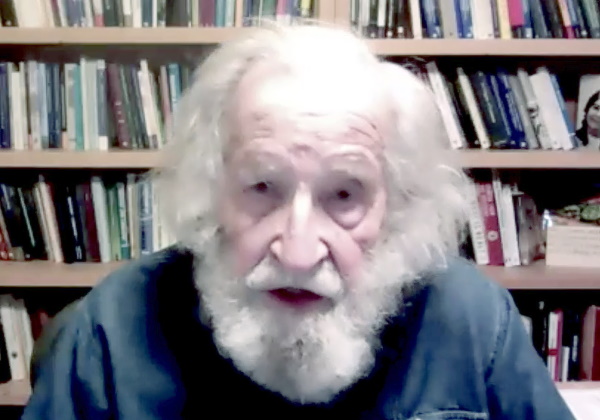
I'm still digging this interview with Noam Chomsky, Noam Chomsky on Jung, Wittgenstein, and Gödel (Ask Me Anything), but this post is similar to another I made earlier today, wherein he gives a complete non-answer to a question for which I really think his answer would be particularly insightful.
Even his non-answers are deep, though, and I've another example. Here, rather than address the hard problem of consciousness, he compares it to the "hard rock of philosophy" (regarding motion) in the time of Isaac Newton. Instead of answering the hard rock within philosophy -- which was what science was called at the time -- Newton and Leibniz developed a mathematical solution we know today as calculus.
However, the problem was never solved.
Attention shifted from physics to mathematics for this issue. Calculus did not provide an answer to the question, but it provided a way of working with motion, and so the question could be ignored. And it has been.
Chomsky says that this is what should happen with the hard problem of consciousness.
I think he's not answering the question.
And I think the hard rock should be answered, also.
Nevertheless, take a look at his elucidation here, it's worth knowing:
In recent years, consciousness has been called the “hard problem,” the real serious problem of philosophy and science. We might look at a little bit of history here. If we go back to the 17th century there was a hard problem - it was motion. Motion was what was called the hard rock in philosophy – philosophy meaning science. We can't comprehend it. Turns out, it was right. We couldn't comprehend it, and we still don't comprehend it - not in the sense in which Galileo, Leibniz, Huygens, Newton, the other great founders of modern science wanted to understand things. For them, intelligibility and understanding meant constructing a mechanical model for it. And mechanical model meant something with gears and levers and cranks and so on. Something like what was being produced all over Europe at that time by highly skilled artisans, amazing people with their imitations of human beings, duck digesting, the fountains at Versailles, and so on. And what was called the mechanical philosophy, meaning mechanical science, that was the basis for the scientific revolution, held that the entire world must be a massive machine of the sky. There was a problem of explaining motion within that system - that was the hard rock. Then Newton came along and said it's hopeless. Newton’s theory crucially involved forces that cannot be captured within the mechanical philosophy. Newton didn't believe it. He spent the rest of his life trying to overcome it. He regarded it as an absurdity that no person of scientific intelligence can possibly accept. Leibniz and others agreed. They accused him of reintroducing the occult properties of the despised Neo-scholastics. And he didn't disagree. Now that's why his Principia is a mathematical theory, not a physical theory. He was crucial on that. "I don't have a physical explanation; I just have something that works." So, we can understand the theory, but we cannot grasp what it's talking about. What's important, just to keep it brief, is that the hard rock in philosophy was abandoned. It was recognized that we cannot comprehend, we cannot gain an intelligible universe modeled that meets our standards of intelligibility. So, it was abandoned, and science just reduced its goals to finding intelligible theories. I think the same is true of consciousness, and many other things. We just abandon the search for an intelligible universe. We try to find intelligible theories that will account for the phenomena and in that respect, there's progress in understanding consciousness. So, there are better theories about some of its properties and so on, and that's the most that we can aspire to. We're not going to achieve for this hard problem what we haven't achieved for other hard problems. It's an illusion. It was correct to give up the search for intelligible account of motion and move on to develop theories which explain it, onto relativistic theories and theories of gravitons, or whatever you like. We don't have an intelligible concept of the universe in the sense of Newton and Galileo, so I think the answer to the question about consciousness is let's find out more about it and develop some kind of theoretical account of what it.
Unlike Chomsky, I think both of these questions need to be solved before we can talk about truly conscious cybernetic intelligence, rather than half-conscious artificial intelligence that simply mimics our own because it has assimilated a trillion-parameter language model relying on the knowledgebase of the Entire Internet.
I wonder if the AGI can help us solve these hard problems, by discerning the truth buried in our own ideas about things, which we haven't seen because we're busy looking at the wrong things, not having the AI ability to look at Everything and distill patterns that we sometimes miss...